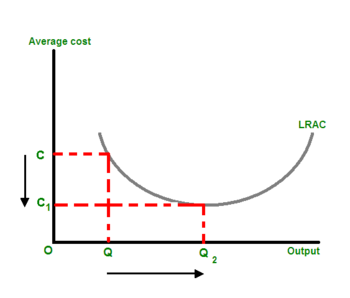If a firm gets cost advantage because of expansion, then it is known as economies of scale. The opposite term for economies of scale, is diseconomies of scale. This scale can be used by any firm in any industry when it expands its operations. For example, expansion of the purchasing operations like buying long term contract, managerial expansion like enhancing the skills of the managers, financial expansion like accessing major financing instruments, and expansion of marketing operations. As a result of change in any of these factors, there is a change in the average cost incurred by the company. Therefore, long run average cost is decreased by pushing down the short run cost. A very simple definition of economies of scale is the point where the firm is producing maximum output in minimum cost. Please view the picture which will give you the better understanding.

